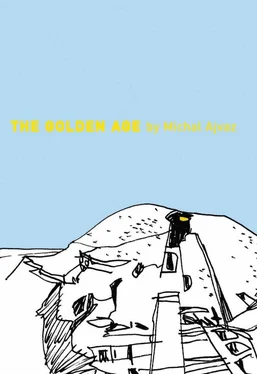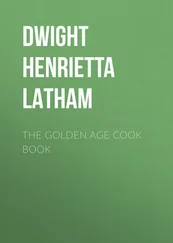Michal Ajvaz - The Golden Age
Здесь есть возможность читать онлайн «Michal Ajvaz - The Golden Age» весь текст электронной книги совершенно бесплатно (целиком полную версию без сокращений). В некоторых случаях можно слушать аудио, скачать через торрент в формате fb2 и присутствует краткое содержание. Год выпуска: 2010, Издательство: Dalkey Archive Press, Жанр: Современная проза, на английском языке. Описание произведения, (предисловие) а так же отзывы посетителей доступны на портале библиотеки ЛибКат.
- Название:The Golden Age
- Автор:
- Издательство:Dalkey Archive Press
- Жанр:
- Год:2010
- ISBN:нет данных
- Рейтинг книги:4 / 5. Голосов: 1
-
Избранное:Добавить в избранное
- Отзывы:
-
Ваша оценка:
- 80
- 1
- 2
- 3
- 4
- 5
The Golden Age: краткое содержание, описание и аннотация
Предлагаем к чтению аннотацию, описание, краткое содержание или предисловие (зависит от того, что написал сам автор книги «The Golden Age»). Если вы не нашли необходимую информацию о книге — напишите в комментариях, мы постараемся отыскать её.
is Michal Ajvaz’s greatest and most ambitious work.
The Golden Age
The Golden Age — читать онлайн бесплатно полную книгу (весь текст) целиком
Ниже представлен текст книги, разбитый по страницам. Система сохранения места последней прочитанной страницы, позволяет с удобством читать онлайн бесплатно книгу «The Golden Age», без необходимости каждый раз заново искать на чём Вы остановились. Поставьте закладку, и сможете в любой момент перейти на страницу, на которой закончили чтение.
Интервал:
Закладка:
And as if all this were not enough to deal with, at the end of the series of suffixes there sprouted bunches of case endings. To this day I remain unsure of quite how many cases the island’s language had. I had the impression that the case system was constantly swelling; I counted seventeen cases, but after I had been on the island a year I discovered another, as if an inflexion had suddenly put out new shoots. I do not know whether an old, little-used grammatical form had risen back to the surface or whether someone had invented a new case because he had needed it or simply liked it. But other cases were dying off, so it seemed there was no danger that the case system would proliferate so as to contain an immeasurable quantity of endings.
Among the connections established by the island’s cases, those that seem to us most important (and that find expression in our own cases) were missing. The case endings of the island’s language expressed relations which seemed to me (at the time I was learning the language) wholly bizarre. For example, one of the cases was only used for nouns referring to things that were the subject of fear connected with the vague and probably not altogether pure intentions of a close relative; another was used for nouns referring to things placed on a soft surface which sagged slightly under the weight of the subject, forming on the surface a star shape of shallow pleats. Things were not much better with conjugation. Verb endings did not express which person the action concerned, nor indeed the number of actors. The ending — vi , for example, determined that the act signified by the verb occurred on a sandy seashore, while the ending — ark made it clear that the action took place on the surface of a cold mirror; if the ending — ut was attached to the verb, this signified that the action was somehow connected with green and red precious stones. Verb endings might also be linked together: for example, the word izarkut meant that it was visible in a mirror how something in which precious stones were sparkling was slowly submerged in water. A strange world emerged out of this declension and conjugation, a network of peculiar relations and roles which was antecedent to logic.
What irritated me most about the island’s extraordinary grammar was not that it concerned itself with unimportant features and relations of reality and created its forms based on the model they provided. The island’s lunatic grammar made me anxious more because of what seemed to me the grimace it gave the face of reality, modelling existence as a series of bizarre statues by pouring the substance of reality — admittedly diaphanous — into such peculiar moulds. One couldn’t really say that their grammar twisted reality, as it looked at reality in embryonic form: it penetrated to the germs of reality and adapted them to its own obscure dreams. The island’s grammar infected the sight, sound, and gesture through which reality comes to us, causing that reality to be composed exclusively of its bizarre and practically endless catalogue of prefixes, suffixes, and endings, its peculiar rhythms, beats, tensions, breaths, gleams, moving shadows, and its attention to whatever goes on inside things or on their surface, for which we do not even have a name.
However, and strangest of all, after a while on the island I began to find its grammar and the reality it created quite natural. This is one of the sicknesses I brought back from the island, of which, it seems, I shall never be cured. As I listen to Czech, now, I sometimes catch myself needing to translate it into the language of the island so that I can understand; and it seems to me that Czech, in common with all other European languages, has on the one hand very little to say about reality, and, on the other hand, contains much that is superfluous. When I hear someone say “They’re on their way,” and I ask myself unhappily why the form of the verb must communicate that more than one person is coming when this detail is not of the least interest to me and in any case will soon be made manifest, I am disturbed that we can’t simply attach an ending to the verb, — rao for instance, making clear that this is an action heightening our impatience while holding in check and subduing a vague fear of the goal that will soon be accomplished. This is the sort of thing that really interests me about whomever is on their way; this is the sort of thing that’s worth taking the time to express, unlike the banal detail that there happens to be more than one of them.
And so Czech and the language of the island grow together in my head; the cases of the island grow like obstinate weeds between the seven cases of Czech, and when I’m alone my thoughts are in this hybrid language — just as incomprehensible to a Czech as it would be to an islander. It happens once in a while that I am in a shop, standing in line at the checkout, lost in thought; that I fail to notice that I’ve reached the front of the line; that the checkout girl tries to get my attention; that I reply in my own language. By the way she looks at me I know she thinks I’m crazy, and I feel embarrassed; I pretend to have mispronounced my intention, or I make out that I’m a foreigner and adopt an accent. Having decided to compose this report on the island, I even considered, initially, writing it in my private language. Certainly no one would read such a book, and certainly too no one would want to publish it, but I dreamed of publishing it myself, of establishing my own press through which I would publish only novels of my own, written in my own language; who knows, perhaps one day someone would buy one of them and set about deciphering its text; on the basis of this perhaps he would then invent a language of his own with marvellous new cases and grammatical categories, in which — let’s say — there will be a verb ending indicating that in the action thus described, a burning energy full of a magnificent malice is gradually exhausting itself, and that this exhaustion evokes relief, nostalgia, and a kind of spine-tingling music.
The adventure of letters
At the same time, I got to know the islanders’ script from their Book (of which I have much to tell in the chapters to come). I had the impression that it was a mixture of fragments from various other scripts. There was a group of characters that gave the appearance of small, schematic pictures of objects, animals, people, and figures; then there were the letters which bore no similarity to objects or living forms, and these could be divided into several groups, including one of simple signs made up of two or three straight lines, another of complicated tangles of wriggling curves that reminded one of a bird’s nest, and another of letters composed of clusters drawn from many barely ascertainable points that increased in density before becoming looser again. My first impression was that the creator of the islanders’ script had composed it in haste; he had borrowed letters hurriedly from many sources without in any way attempting to integrate them into the whole, and afterwards this ill-assorted mix endured by the simple force of habit.
Yet I found this explanation unsatisfactory, and as questions pertaining to the script’s strange diversity continued to tantalize me, I began to pay visits to the royal palace in the hope of discovering in its old papers something about the script’s history. I remember the afternoons I spent seated on the floor of the one of the empty chambers, digging out old documents from under the hot sand and reading them through. No matter where I sat, the crumbling facade of the uninhabited building was always visible in the windows on one side of the room, while the windows on the other side were filled with the splendid blue of the sky; whenever I stood up, the sparkling, azure canopy of the sea was raised to half the height of the windows, as though drawn up by some miraculous pulley. In a distant room I could hear the steps of the queen as she paced, deep in thought; sometimes I would spot her standing in the empty frame of the door, one of dozens of empty frames that playful perspective made into a grooved ornament, a row of characters in the shape of the letter pi , each enclosed in the next, each smaller than the last. Sometimes the siren of a ship sounded in the harbour.
Читать дальшеИнтервал:
Закладка:
Похожие книги на «The Golden Age»
Представляем Вашему вниманию похожие книги на «The Golden Age» списком для выбора. Мы отобрали схожую по названию и смыслу литературу в надежде предоставить читателям больше вариантов отыскать новые, интересные, ещё непрочитанные произведения.
Обсуждение, отзывы о книге «The Golden Age» и просто собственные мнения читателей. Оставьте ваши комментарии, напишите, что Вы думаете о произведении, его смысле или главных героях. Укажите что конкретно понравилось, а что нет, и почему Вы так считаете.












